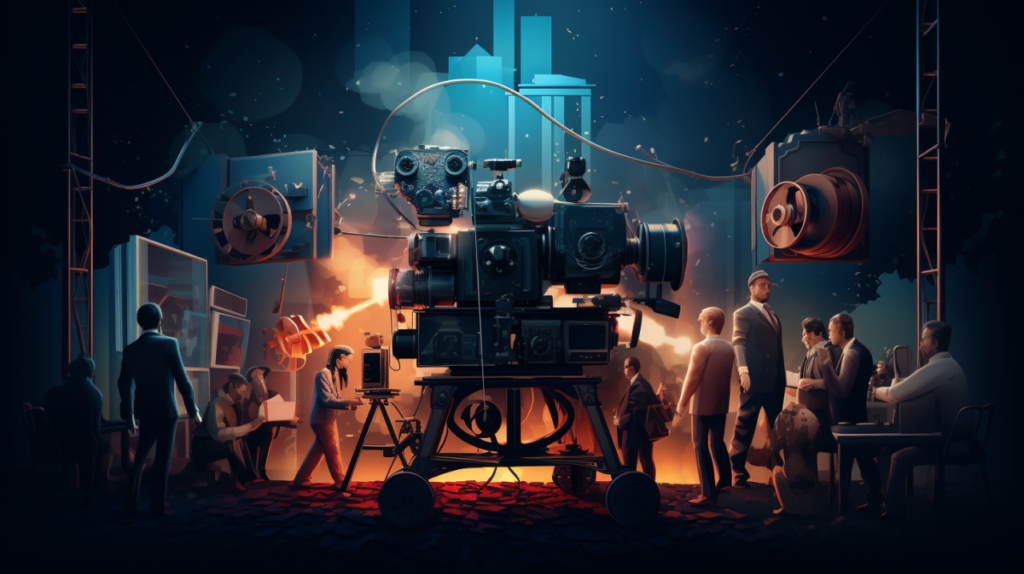
Table of Contents
Artificial Intelligence (AI) is revolutionizing various sectors, and the film and television industry is experiencing its transformative effects. From streamlining workflows to creating new storytelling possibilities, AI is reshaping how content is produced, managed, and delivered. This article delves deeper into the multifaceted impact of AI on film and TV production.
Enhancing Creative Processes
AI tools are becoming invaluable in the creative phase of filmmaking. Advanced machine learning algorithms can analyze scripts, assess plot structures, and provide feedback on narrative elements. AI-driven platforms like ScriptBook use natural language processing to predict a script’s potential success by evaluating its emotional impact and narrative coherence. This technology aids screenwriters in refining their stories and identifying areas for improvement, potentially increasing the chances of a script’s commercial success.
Virtual Production and Impact of AI on Film
One of the most groundbreaking applications of AI in film production is virtual production. AI-powered tools facilitate real-time visualization of CGI elements within live-action scenes. This technology allows directors to see how digital effects integrate with physical environments as they shoot, reducing the need for extensive post-production work. Companies like Industrial Light & Magic and Weta Digital are utilizing AI to create immersive virtual sets and enhance the realism of visual effects, enabling filmmakers to craft complex scenes with greater efficiency.
AI in Cinematography and Camera Work
AI-driven advancements in cinematography are enhancing the way films are shot. AI algorithms assist in automating camera movements and focus adjustments, allowing for more precise and dynamic shots. For instance, autonomous camera systems can track actors’ movements, ensuring optimal framing and focus throughout a scene. Drones equipped with AI technology are also being used for aerial shots and complex angles, providing new creative possibilities while reducing production costs and time.
Post-Production Innovations
In post-production, AI is streamlining the editing process and improving the quality of the final product. AI-powered editing software, such as Adobe Premiere Pro’s Sensei, offers features like automated tagging, scene detection, and smart cropping. These tools can quickly sift through hours of footage, identify key moments, and suggest edits, significantly reducing the time editors spend on manual tasks. Additionally, AI technologies are used to enhance visual effects, such as generating realistic de-aging effects or creating lifelike digital doubles.
AI in Sound Design and Music Composition
AI is also making waves in sound design and music composition. Algorithms can generate music scores based on specific moods, genres, or themes, providing composers with creative starting points or even complete pieces. AI tools like Amper Music and AIVA are used to create custom music tracks for films and TV shows, enabling composers to explore new musical ideas and streamline the scoring process. In sound design, AI can analyze audio data to enhance sound quality, reduce noise, and create realistic sound effects.
Audience Analysis and Content Personalization
Hollywood is embracing AI to revolutionize how content is marketed and tailored to audiences. Data analytics tools powered by AI analyze viewer preferences, viewing habits, and social media trends, offering film studios and streaming platforms valuable insights into audience behavior. This enables Hollywood to create more targeted marketing campaigns and personalized recommendations. For instance, Netflix, along with major Hollywood studios, uses AI algorithms to suggest content based on viewers’ watching history, enhancing the user experience and boosting engagement.
Enhancing Accessibility and Inclusion
AI is contributing to greater accessibility and inclusion in film and TV production. Automatic speech recognition (ASR) and natural language processing (NLP) technologies are used to create accurate subtitles and translations, making content accessible to a global audience. AI-driven tools also assist in generating audio descriptions for visually impaired viewers, ensuring that more people can enjoy and understand visual media.
Ethical Considerations and Industry Challenges
The integration of AI into film and TV production raises important ethical considerations. The use of AI-generated deepfakes and digital actors can blur the lines between reality and fiction, raising concerns about authenticity and consent. Additionally, there are debates about the potential impact of AI on film, particularly for roles traditionally performed by humans, such as screenwriting and editing. Addressing these concerns involves establishing ethical guidelines and ensuring that AI complements rather than replaces human creativity and expertise.
Conclusion
Impact of AI on Film, AI is undeniably transforming the film and television industry, offering innovative tools and techniques that enhance creativity, efficiency, and audience engagement. As AI technology continues to evolve, its integration into various aspects of production will likely deepen, presenting both exciting opportunities and significant challenges. Embracing these changes while navigating ethical considerations will be crucial in leveraging AI’s full potential to shape the future of entertainment.
